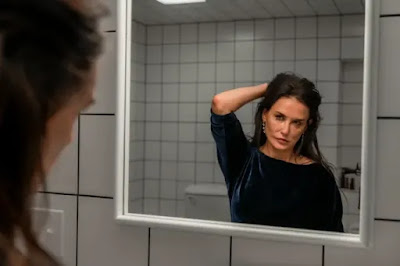After a 5 year hiatus from writing blog posts I return 5 years older and about 45 years wiser (I learned a lot in that time). 5 years of introspective exploration, and 5 years of consuming discourse about ageing, being a woman, and ageing as a woman, and I have returned to the blog anonymous with nothing original or ground-breaking to say. Instead of coming up with answers I've been coming up with questions. What is life? What is womanhood? Why do we (I) fear ageing?
I used to think I feared ageing solely because of its association with death and decay. But now I think differently. This patriarchy treats a woman's youthfulness as the most important thing about her. I heard that women of a certain age are only valued by society if they become a mother, and if you don't you are left to die face down on the street like the Elephant Man. What would that mean for me if I never have children? What would it mean if I did? I heard that women who have children are only valued by society for their status as a mother, and are likely to lose their freedom and their sense of self (I think I'd rather be the Elephant Man). Then, there is invisible woman syndrome, the concept whereby women become disregarded and overlooked in social and professional settings as they age. The Substance probably said it better but sadly I'm too afraid to watch that movie.
It occurred to me recently that I don't know how to be old, and maybe that is why it seems so scary. I only know how to be young, a young adult, and an adult. My definition of old changes greatly over time: a few years ago I thought old meant 30. Now I think old is 75. Regardless, I am definitely getting older. I know this because I've started thinking about foot posture.
I think perhaps what I truly fear is change. With age, change inevitably comes. The changes are microscopic, barely perceptible with each passing day but then suddenly I look around and everything is so different. One day you are in the old school yard, the next you are listening to Cat Stevens and remembering the days of the old school yard. Do I fear getting older, or do I fear not knowing who I will be, how I will be perceived, and what my life will mean? I fear responsibility. I fear regret. I fear looking around one day and realising everyone I ever loved is dead. I fear the great expanse of the ocean.
Does one's emotional depth increase with age? If so, I fear what I will one day be able to feel. What could it feel like to know that there is not enough time left to take another path, to accept that life was what you made it, you cannot try again? Sometimes I look in the mirror and I see my younger self in my reflection's eyes. Sometimes I see my dad's eyes, the way they looked in the rearview mirror when I saw them from the backseat as a child.
I still don't know exactly what my future holds, ageing-wise. Will I perish in the dirt like the Elephant Man, or will I live in the gutter like Grizabella with nothing but memories of my days in the sun? (Yes these are my only 2 options). Although unlike Grizabella I never went in the sun because I didn't want the UV rays to age my skin. This thing goes so deep!!!!!!!!!!
I cannot stop time, therefore, I can only hope to live a life that I won't regret. And for now, I am still young. I still have time to go in the sun. Or, I can hope that a pill is invented soon that causes Margaret Qualley to climb out of my spine and go to my job for me.



































